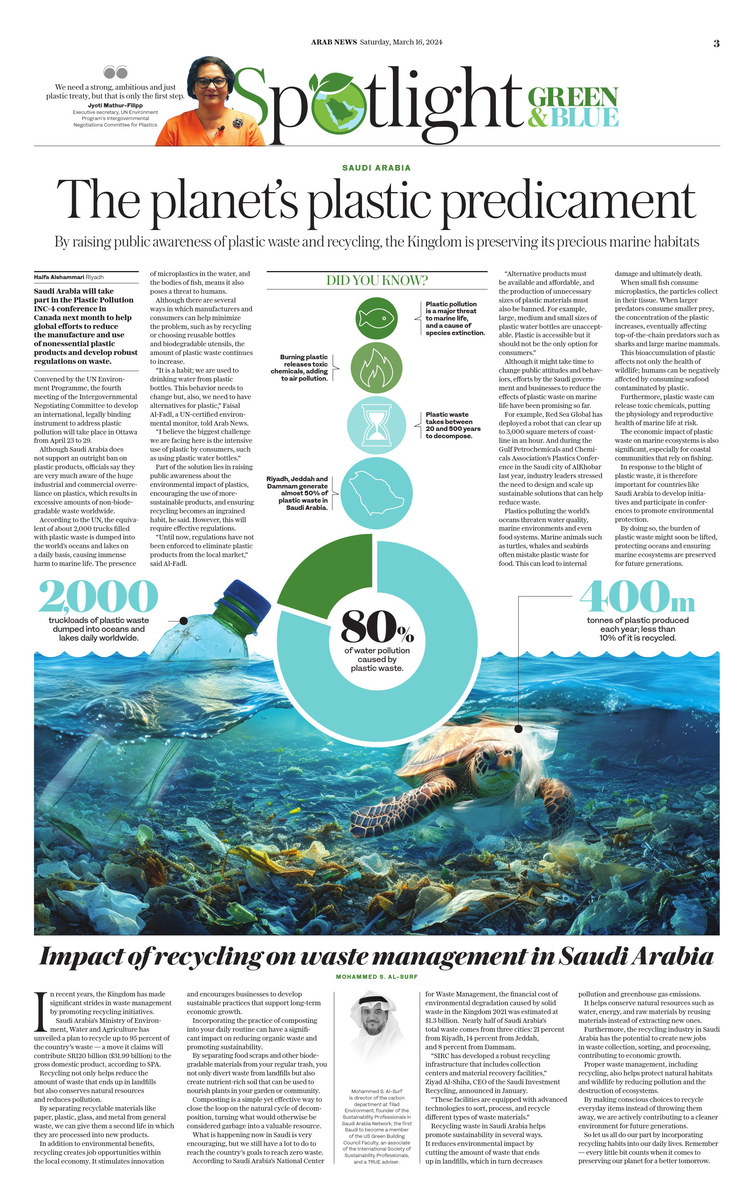Waste management making an impact in Saudi Arabia

https://arab.news/nde79
In recent years the Kingdom has made significant strides in waste management by promoting recycling initiatives.
Saudi Arabia’s Ministry of Environment, Water and Agriculture has unveiled a plan to recycle up to 95 percent of the country’s waste — a move it claims will contribute SR120 billion ($31.99 billion) to gross domestic product, according to SPA (Saudi Press Agency).
Recycling not only helps reduce the amount of waste that ends up in landfills but also conserves natural resources and reduces pollution.
By separating recyclable materials like paper, plastic, glass, and metal from general waste, we can give them a second life in which they are processed into new products.
In addition to environmental benefits, recycling creates job opportunities within the local economy. It stimulates innovation and encourages businesses to develop sustainable practices that support long-term economic growth.
Incorporating the practice of composting into your daily routine can have a significant impact on reducing organic waste and promoting sustainability.
By separating food scraps and other biodegradable materials from your regular trash, you not only divert waste from landfills but also create nutrient-rich soil that can be used to nourish plants in your garden or community.
Composting is a simple yet effective way to close the loop on the natural cycle of decomposition, turning what would otherwise be considered garbage into a valuable resource.
What is happening now in Saudi is very encouraging, but we still have a lot to do to reach the country’s goals to reach zero waste.
According to Saudi Arabia’s National Center for Waste Management, the financial cost of environmental degradation caused by solid waste in the Kingdom in 2021 was estimated at $1.3 billion.
Nearly half of Saudi Arabia’s total waste comes from three cities: 21 percent from Riyadh, 14 percent from Jeddah, and 8 percent from Dammam.
By making conscious choices to recycle everyday items instead of throwing them away, we are actively contributing to a cleaner environment for future generations.
Mohammed S. Al-Surf
“SIRC has developed a robust recycling infrastructure that includes collection centers and material recovery facilities,” Ziyad Al-Shiha, CEO of the Saudi Investment Recycling Company, announced in January.
“These facilities are equipped with advanced technologies to sort, process, and recycle different types of waste materials.”
Recycling waste in Saudi Arabia helps promote sustainability in several ways. It reduces environmental impact by cutting the amount of waste that ends up in landfills, which in turn decreases pollution and greenhouse gas emissions.
It helps conserve natural resources such as water, energy, and raw materials by reusing materials instead of extracting new ones.
Furthermore, the recycling industry in Saudi Arabia has the potential to create new jobs in waste collection, sorting, and processing, contributing to economic growth.
Proper waste management, including recycling, also helps protect natural habitats and wildlife by reducing pollution and the destruction of ecosystems.
By making conscious choices to recycle everyday items instead of throwing them away, we are actively contributing to a cleaner environment for future generations.
So let us all do our part by incorporating recycling habits into our daily lives. Remember — every little bit counts when it comes to preserving our planet for a better tomorrow.
• Mohammed S. Al-Surf is director of the carbon department at Tilad Environment; founder of the Sustainability Professionals in Saudi Arabia Network; the first Saudi to become a member of the US Green Building Council Faculty; an associate of the International Society of Sustainability Professionals; and a TRUE adviser.




























